Mary Anne Yarde's Blog: The Coffee Pot Book Club , page 126
August 15, 2019
Join Historical Romance author, Elizabeth Keysian, as she takes a look at the Georgian remedies that will make your hair stand on end #Regency #History @EKeysian
Georgian remedies that will make your hair stand on end.By Elizabeth Keysian
*Please don’t try any of these remedies at home!
You wouldn’t want to get sick in Georgian England. Some of the remedies cited below include scary substances such as vitriol (copper sulphate) and bullock’s gall. Our ancestors were also fond of purges and blood-letting to eliminate sickness, something that simply does not appeal today. Hence my advice that you do NOT attempt any of these remedies yourself.
Cure for Baldness
“To cause hair to grow take two ounces of Boar’s grease, one dram of the ashes of burnt Bees, one dram of the Ashes of Southernwood, one dram of the Juice of a white Lilly Root, one dram of Oil of sweet Almonds, and six drams of pure Musk; and, according to Art, make an Ointment of these; and the day before the full Moon, shave the place, and anoint it every Day with this Ointment. It will cause Hair to grow where you will have it. Oil of sweet Almonds, or Spirit of Vinegar, is very good to rub the Head with if the Hair grows thin.”
 From The Compleat Housewife, or Accomplish’d Gentlewoman’s Companion, E. Smith, c.1736
From The Compleat Housewife, or Accomplish’d Gentlewoman’s Companion, E. Smith, c.1736Drowning
“In attempting to recover persons apparently drowned, the principal intention to be pursued is, to restore the natural warmth, upon which all the vital functions depend; and to excite these functions by the application of stimulants, not only to the skin, but likewise to the lungs, intestines, etc. Though cold was by no means the cause of the person’s death, yet it will prove an effectual obstacle to his recovery. For this reason, after stripping him of his wet clothes, his body must be strongly rubbed for a considerable time with coarse linen cloths, as warm as they can be made; and, as soon as a well heated bed can be got ready, he may be laid on it, and the rubbing should be continued. Warm cloths ought likewise to be frequently applied to the stomach and bowels, and hot bricks, bottles of warm water, to the soles of his feet, and to the palms of his hands. Strong volatile spirits should be frequently applied to the nose; and the spine of the back and pit of the stomach may be rubbed with warm brandy or spirit of wine. The temples should also to be chafed with volatile spirits; and stimulating powders, as that of tobacco or marjoram, may be blown up the nostrils.”
 From Domestic Medicine: or a Treatise on the Prevention and Cure of Diseases, William Buchan M.D. 1792
From Domestic Medicine: or a Treatise on the Prevention and Cure of Diseases, William Buchan M.D. 1792Bleeding from the nose
“Where it is not considered beneficial to allow the bleeding to continue, the patient should be set nearly upright with his head reclining a little and his legs immersed in water about the warmth of new milk. His hands ought likewise to be put in lukewarm water and his garters may be tied a little tighter than usual. Ligatures may be applied to the arms about the place where they are usually made for bleeding, and with nearly the same degree of tightness. These must be gradually slackened as the blood begins to stop, and removed entirely as soon as it gives over. Sometimes dry lint put up the nostrils will stop the bleeding. When this does not succeed, dossils of lint dipped in strong spirits of wine may be put up the nostrils, or if that cannot be had, they may be dipped in brandy. Blue vitriol dissolved in water may likewise be used for this purpose.”

From Domestic Medicine: or a Treatise on the Prevention and Cure of Diseases, William Buchan M.D. 1792
Insect Sting
“With regard to poisonous insects, as the bee, the wasp, the hornet etc their stings are seldom attended with danger, unless when a person happens to be stung by a great number of them at the same time; in which case something should be done to abate the inflammation and swelling. Some, for this purpose, apply honey, others lay pounded parsley to the part. A mixture of vinegar and Venice treacle is likewise recommended; but I have always found rubbing the part with warm salad oil succeed very well. Indeed, when the stings are so numerous as to endanger the patient’s life, which is sometimes the case, he must not only have oily poultices applied to the part, but should likewise be bled, and take some cooling medicines, as nitre, or cream of tartar, and should drink plentifully of diluting liquors. It is the happiness of this island to have very few poisonous animals, and those which we have are by no means of the most virulent kind. Nine-tenths of the effects attributed to poison or venom in this country, are really other diseases, and proceed from quite different causes.”
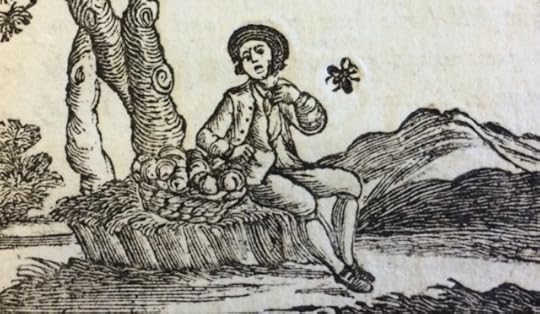
From Domestic Medicine: or a Treatise on the Prevention and Cure of Diseases, William Buchan M.D. 1792
A serious scalding- anecdote
“As example teaches better than precept, I shall relate to the treatment of the most dreadful case of this kind that has occurred in my practice. A middle-aged man, of a good constitution, fell into a large vessel full of boiling water, and miserably scalded about one half of his body. As his clothes were on, the burning in some parts was very deep before they could be got off. For the first two days the scalded parts had been frequently anointed with a mixture of lime water and oil, which is a very proper application for recent burnings. On the third day, when I first saw him, his fever was high, and his body costive, for which he was bled, and had an emollient clyster administered. Poultices of bread and milk, softened with fresh butter, were likewise applied to the affected parts, to abate the heat and inflammation. His fever still continuing high, he was bled a second time, was kept strictly on the cooling regimen, took the saline mixture with small doses of nitre, and had an emollient clyster administered once a day. When the inflammation began to abate, the parts were dressed with a digestive composed of brown cerate and yellow basilicum. Where any black spots appeared they were slightly scarified, and touched with the tincture of myrrh; and, to prevent their spreading, the Peruvian bark was administered. By this course, the man was so well in three weeks as to be able to attend his business.”
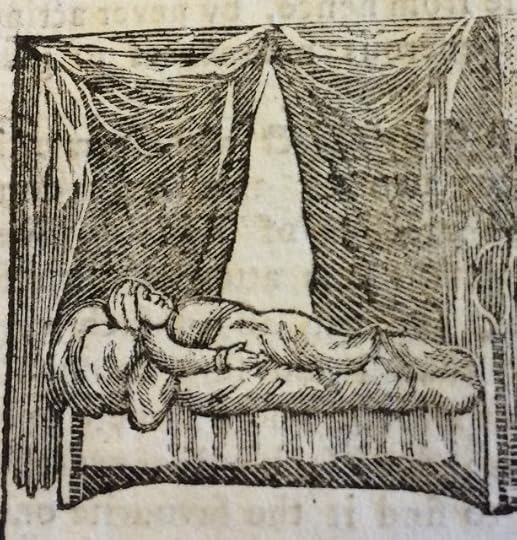 From Domestic Medicine: or a Treatise on the Prevention and Cure of Diseases, William Buchan M.D. 1792
From Domestic Medicine: or a Treatise on the Prevention and Cure of Diseases, William Buchan M.D. 1792
Sprains
“For a sprain put an ounce of camphor, sliced or coarsely pounded, into a pint bottle; add half a pint of rectified spirit of wine; and nearly fill up the bottle with bullock’s gall. Let it stand two to three days by the fireside, shake it frequently, till all the camphor be completely dissolved, and keep it very closely stopped for use. The sprained part is to be bathed plentifully every three or four hours, till relief be obtained.”
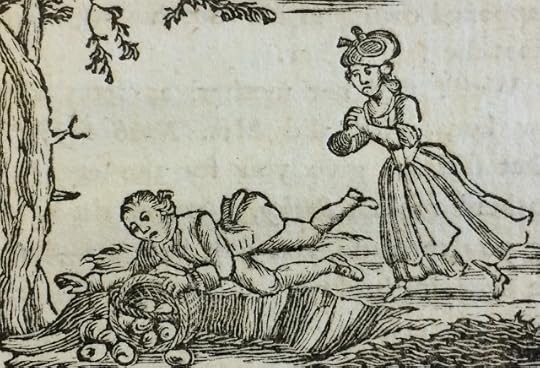 From The Female Instructor, or Young Woman’s Companion, 1815
From The Female Instructor, or Young Woman’s Companion, 1815Concussion
“The best treatment of the commencement of a violent stunning is, to place the patient in a warm bed, to apply bladders of hot water over the region of the heart and stomach, and to employ gentle friction to the limbs. When he begins to recover, a little warm slop may be given, but no brandy, wine, or other stimulants, for all severe injuries of the head are liable to be followed by inflammation, and we should have our eye to this probable consequence for many days after the receipt of such an injury. The patient must be kept quiet, and have a black draught to empty the bowels. If, as he recovers sense and the power of motion, he grows irritable, and has pain in the head, and flushing of the face, we should anticipate inflammation by taking a pint of blood from the arm, and giving some more purging physic; and should active inflammation of the brain supervene, the means noticed under that head must be rigorously enforced.”
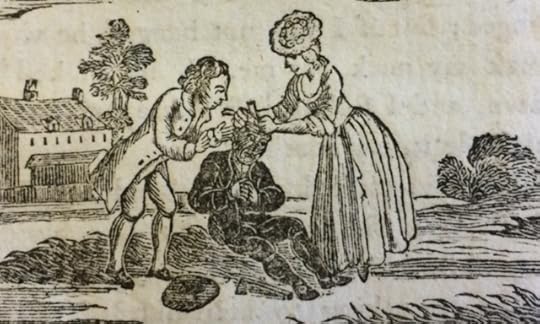
From Modern Domestic Medicine, Thomas Graham, 1827
Elizabeth Keysian’s latest book is a Regency romance, I LOVE TO HATE YOU, and is Book #1 in the brand new Marry in Haste series.
I Love To Hate YouBy Elizabeth Keysian

Never get caught in a trap of your own making.
Miss Athene Hartville must marry quickly, before her inheritance runs out. When her flirtatious chaperone secures an invitation to spend the week with an eccentric duke and his guests, Athene’s hopes of finding a rich husband soar. Until, that is, her childhood nemesis Viscount Rushbourne, arrives. He threatens to trample her ambitions into the dust.
Struggling to manage his ailing father, a maverick younger brother, and an unwieldy earldom, Rushbourne’s reunion with the fiery Athene is a welcome distraction. Then he uncovers a conspiracy against him that could lead to his total ruin.
His only hope is to win Athene’s heart…but can he pay the price and accept her bitter revenge?
Pick up your copy ofI Love To Hate YouAmazon UK • Amazon US • Amazon CA • Amazon AU
Elizabeth Keysian
 Bestselling author Elizabeth Keysian adores history and archaeology, and writes romances that give the reader an experience of travelling back in time.
Bestselling author Elizabeth Keysian adores history and archaeology, and writes romances that give the reader an experience of travelling back in time.She feels very British-despite her Viking ancestry-and loves creating rich backdrops for her stories based on real places and actual experiences. She used to be a re-enactor, so has sampled the living conditions, clothing, and smells of the past. She’s also sampled the food, which was actually pretty good.
Her characters battle their problems with both tears and laughter, but she always guarantees them a Happily Ever After, no matter what she’s put them through.
Subscribers to Elizabeth’s Key to Romance newsletter have access to exclusive content, contests and advance notice of bargains and freebie books: Newsletter Signup.
Elizabeth is a founder member of A Touch of Intrigue – a Gathering of Authors and Readers of Historical Romance. They have the best Facebook parties EVER. Please join up: HERE!
You can find Elizabeth on Facebook• Twitter• Pinterest.
Published on August 15, 2019 20:00
August 14, 2019
Check out AnneMarie Brear's fabulous new book — Beneath a Stormy Sky #Victorian #HistoricalRomance @annemariebrear
Beneath a Stormy SkyBy AnneMarie Brear

Surviving a shipwreck was the least of her problems.
Louisa Reynolds loses her brother when their ship goes down in a storm off the west coast of Australia. Stranded and alone on a deserted beach she is rescued by a young aboriginal girl, who keeps her alive, and teaches her the ways of the native people.
When eventually Louisa stumbles into the nearest town of Albany, she must gather her strength to start again. Befriended by two men, old gentleman George and the dashing Connor, she finds that life is worth living. The unexpected friendship with both Connor and George gives her new joy. She’s invited to stay at George’s sheep station. However, as a single woman in the company of men, she is soon the talk of gossips.
Her feelings for Connor intensify, but when she learns more about him, she is shattered by a revelation and it is gentle George who she suddenly marries.
Only, settling into station life comes with its own problems when Louisa realises that George has money problems and is close to losing everything. Confronted by a devastating fire and a gang of bushrangers, Louisa feels as though her world is spinning out of control.
Can she save the station, and how long can she deny the love she feels for Connor?
Excerpt
‘Hold on to me!’ David shouted above the roar of the wind and rain. The storm was much worse than she had realised. The small window in her cabin had given her a glimpse, but the wildness and ferocity was real and frightening. The weak moonlight which disappeared behind scudding clouds made the scene before her even more terrifying.
She grasped David’s belt, the deck slippery and unstable beneath her feet. The ship’s timbers groaned in protest as it was lifted high on the swell and then plunged back down again. Something cracked above their heads and David pulled her down to her knees as a spar broke free and the wind hurled it like a weapon onto the decks.
A woman screamed as a wave gathered in height, its white froth looked menacing. It rose above them like a living demon and smashed onto the ship. It ripped a woman out of her husband’s arms and into the wild black sea. Sailors worked fast, trying to launch the boat, but the rigging snagged. When a huge wave tipped the ship sideways, the rigging snapped like a cracked whip, releasing the shore boat over the side. The force took three sailors with it, crashing into the sea. Shouts and yells were drowned out by the boom of the wind.
David pushed her behind a stack of cargo and held onto the ropes securing it. ‘The shore boat is gone.’
‘Is there another one?’ She wiped water from her face, peering at him in the dimness.
‘I don’t think so.’ Rain plastered his hair to his scalp.
She fought back a gulp of fear, concentrating on David’s face. As she went to speak the ship tilted alarmingly sending everyone skidding to the left.
Louisa screamed as she slid along the deck and smashed against the rail.
David grabbed her, the ocean rising up just a few feet from where they lay. ‘We are listing badly. That cargo is straining its ropes. We’ve got to get off the ship. It’s going down.’
Expecting the ship to right itself, Louisa’s eyes grew wide with panic as it stayed on its side and water rushed down into the decks below.
‘Come on!’ he yelled in her ear, scrambling along the rail. ‘Hurry!’
The noise of the ship breaking apart seemed incredible, unbelievable. People screamed, the wind roared, the waves crashed on them and timbers squealed in protest. Lanterns had gone out, pitching them all in darkness.
David threw an empty crate over the rail. ‘We are going to jump in and swim to the crate. It will keep us afloat.’
Nodding, she held fast to his wet coat.
He stared into her eyes and in the murky light she gulped at his serious expression. ‘You go first and swim as fast as you can to the crate. Don’t stop, just get to the crate. Understand?’
‘Yes.’
‘I’ll be right behind you. Now go.’
Terrified, she looked at the angry black ocean wreaking havoc on the ship and passengers. The wind whipped her wet hair into her eyes as she climbed over the railing. Waves rose up to meet her and she shrieked as her foot slipped.
‘Go Louisa!’
‘I can’t do it!’ she called back to him. She’d never been so frightened in her life.
He grabbed her arms to steady her. ‘Look at me. Do you trust me to keep you safe?’
‘Yes.’
‘Jump. Now.’
Pick up your copy ofBeneath a Stormy SkyAmazon UK • Amazon US
AnneMarie Brear
 AnneMarie was born a small town in N.S.W. Australia, to English parents from Yorkshire. She is the youngest of five children. Her love of reading fiction started at an early age with Enid Blyton’s novels, before moving on into more adult stories such as Catherine Cookson’s novels as a teenager. Living in England, during the 1980s she discovered a love of history by visiting the many and varied places of historical interest.
AnneMarie was born a small town in N.S.W. Australia, to English parents from Yorkshire. She is the youngest of five children. Her love of reading fiction started at an early age with Enid Blyton’s novels, before moving on into more adult stories such as Catherine Cookson’s novels as a teenager. Living in England, during the 1980s she discovered a love of history by visiting the many and varied places of historical interest.The road to publication was long and winding with a few false starts, but she finally became published in 2006. Since that time, many novels and several short stories have been published. She writes historical novels set in Yorkshire and/or Australia in the eras covering from Victorian to WWII. Her books are available in ebook and paperback from bookstores, especially online bookstores such as Amazon.
AnneMarie enjoys reading and gardening. Spending time visiting old country house estates and castles helps her find ideas for her books. She’s interested in genealogy and researched her family trees. She loves chocolate (who doesn't?) and enjoys travelling, cooking and surfing the web (research purposes, obviously, not wasting time on Facebook!)
Connect with AnneMarie: Website • Twitter • Facebook.
Published on August 14, 2019 21:00
Have you heard? Margaret Skea's fabulous #NewRelease — Katharina Fortitude — is only 0.99 on Kindle for a Limited TIme! #HistoricalFiction @margaretskea1
Katharina FortitudeBy Margaret Skea

'Beautifully written and meticulously researched - historical fiction at its best.' BooksPlease
Wittenberg 1525. The unexpected marriage of Martin Luther to Katharina von Bora has no fairytale ending.
A sign of apostasy to their enemies, and a source of consternation to their friends, it sends shock waves throughout Europe.
Yet, as they face persecution, poverty, war, plague and family tragedy, it is Katharina’s resilience and strength of character which shines through.
While this book can be read as a standalone, it is also the powerful conclusion to her story, begun in Katharina: Deliverance. (Runner-up in the Historical Novel Society New Novel Award 2018.)
If you like your historical fiction to be vivid, authentic and absorbing, this book is for you.
Excerpt
Chapter OneWittenberg June 1525.
The music stops, the sound of the fiddle dying away, the piper trailing a fraction behind, as he has done all evening. I cannot help but smile as I curtsy to Justus Jonas, his answering twinkle suggesting he shares my amusement.
‘Thank you, Frau Luther,’ and then, his smile wider, so that even before he continues I suspicion it isn’t the piping amuses him, ‘For a renegade nun, you dance well.’
It is on the tip of my tongue to respond with ‘ For a cleric, so do you,’ but I stop myself, aware that should I be overheard it would likely be considered inappropriate for any woman, far less a newly married one, to speak so to an older man, however good a friend he has been. And on this day of all days, I do not wish to invite censure. Instead I say, ‘I have been well taught. Barbara saw to that. She did not wish me to disgrace myself or her, and there is a pair of slippers with the soles worn through to testify to the hours of practice she insisted upon.’
‘She succeeded admirably then.’
All around us there is the buzz of laughter and chatter, an air of goodwill evident in every flushed face. Martin is waiting at the foot of the dais, and as we turn towards him, his smile of thanks to Justus is evidence he too is grateful for the seal of approval, of me and of the marriage, our shared dance a tangible sign to the whole town that Justus Jonas at least has no reservations regarding our union. Over his shoulder I catch Barbara’s eye and she nods also. I nod back, but am unable to suppress altogether the inner voice, tonight there is drink taken, tomorrow some may feel differently.
As if he can read my mind, Justus says, a new seriousness in his tone, ‘You have not made a mistake, either of you.’ He waves his hand at the folk clustered in groups along the length of the room. ‘Look around. When the difficult times come, as no doubt they will, remember tonight and the number of those who came to wish you well.’
* * *
The first challenge is not long in coming. We stroll home in the moonlight, accompanied by those guests who will spend the night in the cloister with us, adding their acceptance to our union. Among them are Martin’s parents, and three councillors from Mansfeld, snatches of their conversation penetrating my thoughts.
Hans Luder’s tone, though gruff, cannot mask his satisfaction. ‘It is a good day’s work, and glad I am to see it, however long the wait.’
Martin’s mother’s voice is sweet and low, but bubbles with amusement, like a sparkling wine as it is poured into a glass. ‘Old you may be, but I trust your end is not yet nigh.’
There is an answering chuckle from one of the councillors, ‘Indeed,’ Frau Luder, ‘So do we all.’
Hearing him, I tuck my arm into Martin’s, the momentary disagreement regarding Cardinal Albert’s gift forgotten, and look up at the myriad stars: pin-pricks of light in an ink-flooded sky, and my heart swells. Frau Luther – the spelling may be different, but the status is the same and a title to be proud of, and though our marriage is already two weeks old, it is the first time I have felt it truly mine. The music still rings in my ears, memory of the dancing, the coin in the chest: all symbols of the regard in which the doctor is held and in which I now share, spreading a warmth through me from the top of my head to the tip of my toes. Jusuts is right. This is not a mistake, or not on my part at least. And, pray God, he is right about Martin also. We part from the company at the door of our chamber, and the light from the oil lamp flickers on the bedspread Barbara Cranach gifted to us. It is the last thing I see before sleep, the first when I wake, a talisman-harbinger of good things to come.
Only 0.99 on Kindle for a Limited TimePick up your copy of Katharina FortitudeAmazon UK • Amazon USRead for FREE on

Margaret Skea
 Margaret Skea is an award-winning novelist and short story writer. Short story credits include Neil Gunn, Fish, the Historical Novel Society and Mslexia.
Margaret Skea is an award-winning novelist and short story writer. Short story credits include Neil Gunn, Fish, the Historical Novel Society and Mslexia.Growing up during the ‘Troubles in Northern Ireland it is perhaps inevitable that her writing often focuses on the pressures of living within conflict. Her debut novel Turn of the Tide, was the Historical Fiction winner in an Harper Collins-sponsored competition. It also gained her the Beryl Bainbridge Award for 'Best First-Time Novelist 2014'.Katharina: Deliverance, a fictionalised biography based on the early life of the reformer Martin Luther’s wife, was placed 2nd in the Historical Novel Society New Novel Award 2018.
The newly released, Katharina: Fortitude, is the powerful conclusion to Katharina’s story, but both books can easily be read as a stand-alone.
Connect with Margaret: Website • Twitter • Facebook.
Published on August 14, 2019 20:00
August 13, 2019
Join #HistoricalFiction author, Joan Fallon, as she shares her inspiration behind her fabulous book — The Apothecary (City of Dreams Book 1) #History #Spain
The Apothecary (City of Dreams Book 1)An Author’s InspirationBy Joan Fallon
I have lived in Málaga, on and off, for more than thirty years now, and love the city, which seems to get more interesting and more beautiful every year. In the al-Andalus trilogy I had written at length about Moorish Spain, and Córdoba in particular, so last year I felt that it was now time to discover what it must have been like to have lived in Málaga almost a thousand years ago, when it too was ruled by the Moors.
 The alcazaba in Malaga.
The alcazaba in Malaga.In my new historical series ‘The City of Dreams’ I try to make sense of some very turbulent times. Under the Omayyads, Moorish Spain had been a stable, peaceful and united country, famed for its learning, culture and wealth. But all that was because of one man, Abd al-Rahman III. When he died in 961 AD his son al-Hakim carried on his work, until an attack of apoplexy cut short his reign. He left his only son, an eleven-year-old boy, to succeed him. His son was no warrior and untrained in statesmanship, so he soon fell under the complete control of his ministers. Although nobody realised it at the time, that was the beginning of the end for the Omayyad dynasty, and in 1009 AD the country became embroiled in a civil war which lasted until 1013, by which time Córdoba had been razed to the ground, its universities and libraries destroyed and its citizens killed or exiled. The Golden Age of Moorish Spain was over and al-Andalus had split into a number of warring princedoms, which were referred to as 'taifas.' Málaga was one of those taifas, but with a difference; the Hammudite prince who ruled the taifa had decided to claim the title of caliph for himself. A move which was to cause problems for him and his successors, none of whom lived more than a few years after coming to the throne.
The City of Dreams trilogy opens in 1035 AD, some twenty years after the family escaped from Córdoba. In the first novel, ‘The Apothecary,’ Makoud who was just a young lad in the previous series, is now a middle-aged man. Born and bred in a city, he finds country life too restrictive for him and decides to bring his family to Málaga, to make a new life for them all. At first everything goes well. Makoud opens his own apothecary shop and his sons find work. But when the caliph dies in strange circumstances and rumours suggest that he has been poisoned, Makoud becomes worried that he may have been the one who inadvertently sold the poison to the assassin. His eldest son, a soldier, decides to investigate the caliph's death and soon finds himself caught up in a web of intrigue, lies and murder. When he ends up in the dungeons of the alcazaba under sentence of death, his family is horrified and know the only way to save him is to find the perpetrator of these crimes.
As I mentioned earlier, this was an uncertain and turbulent time for everyone. You only have to look at the following maps to see how the political borders changed dramatically as a few of the more warlike rulers made their taifas stronger and more powerful, in particular Abbad I of Seville, who had his eyes on the rich and strategically placed port of Málaga.
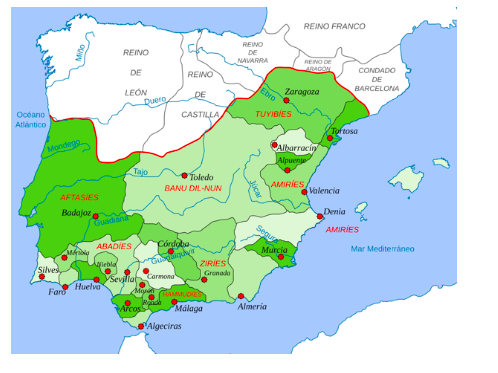 Map of al-Andalus 1037AD/
Map of al-Andalus 1037AD/ Map of Seville in 1066 AD showing how it has swallowed up so many of its neighbours in a space of thirty years. And below that a map showing that by 1080 most of al-Andalus has been divided between the powerful taifas of Badajoz, Seville, Toledo and Zaragoza. Only Málaga, Granada and and Álmeria managed to hold out for a few more years.
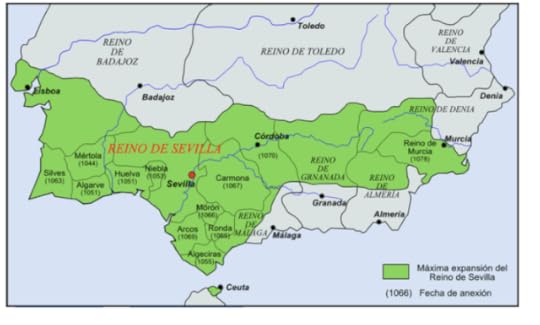
In this short extract from ‘The Apothecary’ Makoud’s son, Umar starts on an investigation that will eventually lead to his arrest.
The khalifa was dead. Umar felt strangely sad for this man whom he hardly knew and had only seen on a couple of occasions. He remembered how impressed he’d been the first time he’d seen him, such a proud, noble man; everything about him said he’d been born to rule. Umar had felt privileged to serve him. He was a man who deserved a warrior’s death, not to die in such a horrible way. Rumours had spread through the alcazaba like wildfire. They said that on his death bed he cried out in terror at phantoms only he could see, and writhed in pain as the sickness worked its way through his emaciated body. It was said the physicians still had no idea what had caused his death; they’d been able to do nothing to help him. Now it was too late. According to the gossip they stood around his bedside and had no explanation for such a rapid decline in a man still in his prime. The grand vizierhad put out an announcement that Khalifa Yahya I had died from an injury sustained in the battle of Qarmuña, but the rumour that Yahya had been poisoned persisted.
Weeks ago, when his father had told Umar about the customer who had repeatedly bought wormwood from him, he hadn’t given it much thought, but now that the khalifa was dead he couldn’t get this information out of his mind. So were the rumours true? Had the khalifa been assassinated? Had that man who’d gone to Baba’s shop poisoned him? Was he the murderer? And if so, what should Umar do? Should he speak to his commander about it? But if he did that, then he’d have to tell him that it was his father who’d sold the wormwood to the man, and then his commander might think that Makoud was complicit in the murder. It was too risky. No, first he needed to find out more about this man and try to track him down. But how? The obvious place to start was at home; both his father and his brother had seen him. Maybe they knew more about him than they’d told him. What had made them suspicious in the first place? Was it something he’d said? More importantly, had they seen him again? Maybe he lived close by. Yes, it made sense to start by talking to his father again.
The Apothecary (City of Dreams Book 1)By Joan Fallon
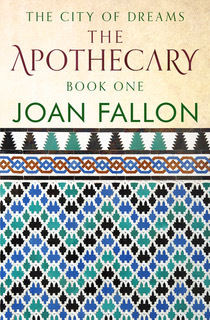
In the first novel in a new historical series set in Moorish Spain, Joan Fallon sets the action in the busy medieval port of Málaga. Following on from the successful al-Andalus series, we meet up again with the younger members of the family who had escaped from the besieged city of Córdoba.
Makoud, now a middle-aged apothecary, has come to Málaga with his family to work. Shortly after they arrive they hear of the sudden death of the caliph, Yahya I and rumours that he was poisoned. Makoud is worried that the poison used by the assassins was bought from his shop. His son, Umar, now a soldier in the caliph’s army, decides to investigate but he underestimates the power of the people behind the assassination, and instead he finds himself accused of murder and locked in the dungeons. His father, family and friends pool all their resources to try to help him but the closer they get to the truth, the greater the danger they are all in.
Pick up your copy of The Apothecary Amazon UK • Amazon US
Joan Fallon
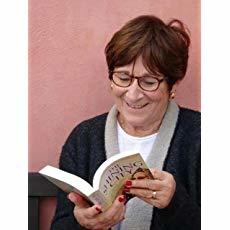 Joan Fallon was born in Dumfries, Scotland but spent most of her adult life in England. Teacher, management trainer and business woman, she moved to Spain at the beginning of the new millennium and became a writer. Her first published work was a social history, 'Daughters of Spain', inspired by the women she met in her adopted home. Her subsequent books too have grown out of her experiences living and working in Spain. She is especially interested in Spanish history and has set her novels in periods as distinct as the Golden Age of the Moorish conquest and the Spanish Civil War. She is a member of the Society of Authors and the Alliance of Independent Authors.
Joan Fallon was born in Dumfries, Scotland but spent most of her adult life in England. Teacher, management trainer and business woman, she moved to Spain at the beginning of the new millennium and became a writer. Her first published work was a social history, 'Daughters of Spain', inspired by the women she met in her adopted home. Her subsequent books too have grown out of her experiences living and working in Spain. She is especially interested in Spanish history and has set her novels in periods as distinct as the Golden Age of the Moorish conquest and the Spanish Civil War. She is a member of the Society of Authors and the Alliance of Independent Authors.Connect with Joan: Website•Facebook • Goodreads.
Published on August 13, 2019 20:00
August 12, 2019
#HistoricalRomance author, April Munday, is talking about the inspiration behind her fabulous series — The Soldiers of Fortune @AprilMunday
The Mercenary’s TaleBy April Munday
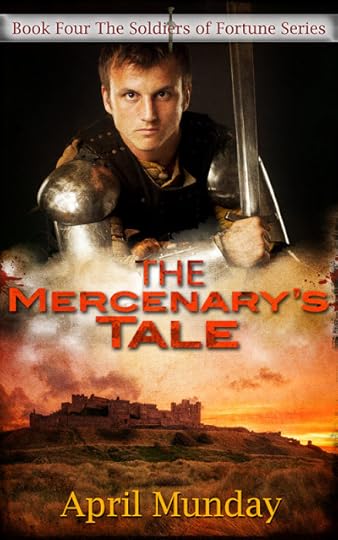
1366Aymer Montfort has been a mercenary for ten years, but it’s time for him to return home and make his peace with the brother who accused him of murder. He is less than enthusiastic when he is persuaded to take a beggar with him to England.
Melissant de la Chapelle set out on a pilgrimage with a father and servants. After their murders, she’s alone and penniless. She has been begging in Calais for a month when Aymer rescues her. His kindness makes it easy for her to fall in love with him, but all he seems to care about is ridding himself of her as soon as possible. The journey home is more dangerous than either of them could have imagined.
An Author’s Inspiration
Some years ago I read a book about the concept and practice of pilgrimage in the Middle Ages. It was a fascinating book, and one of the things that stayed with me after I read it was the story of a young woman who was on a pilgrimage with her father and their servant. The father and the servant were murdered and the small group’s money stolen, leaving the woman alone in a town far from home with no one to protect her and no means of feeding or housing herself.It’s the sort of thing that must have happened fairly frequently, for pilgrims, especially at the beginning of their journey, often carried a lot of money: going on a pilgrimage could be an expensive business. English pilgrims had to pay to cross the Channel by boat, then there were all kinds of tolls to cross bridges and enter towns along the route. Pilgrims were supposed to be exempt from most tolls, but the exemption wasn’t always observed. Often pilgrims could find free accommodation and a meal in monasteries and hostels run by monasteries, but inns would always charge. Sleeping under the stars was free, but it wasn’t always a good idea, even if you were part of a large group. Apart from the possibility of being exposed to inclement weather, there was always the chance of being attacked by thieves. Food and ale or wine had to be bought, although there was always a chance that some pious person would donate them for the benefit of his soul. A pilgrim, therefore, needed money for the journey.Some pilgrims worked as they travelled, so carried little money, but others carried enough money to see them through the weeks or months that the pilgrimage would take. For many, it was safer than leaving it at home in the care of relatives or the church. There were no banks and nowhere to store possessions securely. Houses and chests could be broken into and servants might be more inclined to help themselves to their master’s wealth than to protect it. Leaving it with the church or relatives might seem like a good idea, but many of those who did found themselves involved in a dispute about ownership on their return. If you couldn’t trust the church or your own family, it might be better to risk taking as much as you could with you.Thieves and robbers who attacked and robbed pilgrims were threatened with excommunication, but that wasn’t always a deterrent. If the pilgrim was rich enough, the rewards could be great. Pilgrims often travelled in large groups for protection, but they carried no weapons beyond a wooden staff. The staff could be used for defence, but the chances of holding off a well-armed band of robbers were slim.The end result was that pilgrims were robbed and killed, and women could find themselves with nothing in a foreign country. The more I thought about it, the more I realised how impossible the situation of such a woman would be. How could she survive without help? How would she communicate with the people around her? How would she protect herself?There was a story that I could tell here. A lone woman in a foreign country, who couldn’t speak the language was definitely a damsel in distress. Her immediate needs might be taken care of by a monastery providing accommodation to pilgrims, but could she truly be considered a pilgrim if she didn’t have the means of continuing her journey?In The Mercenary’s Tale , Melissant is the woman left to fend for herself after her father and their servants have been killed. She has no means of continuing her pilgrimage, nor of returning home. As each day passes her situation grows worse.Once I had a damsel in distress, I needed a knight to rescue her. Aymer Montfort is the reluctant hero. He’s a wealthy mercenary who wants nothing to do with the ragged Englishwoman begging in the streets of Calais. A friend persuades him to do a good deed that almost costs the three of them their lives. The Mercenary’s Tale is the fourth book in the Soldiers of Fortune series, but can be read as a standalone.

Start your reading adventure today!The Soldiers of Fortune seriesAmazonUK • Amazon US
Read for FREE with

April Munday
 April Munday is the author of eight romances set in the fourteenth century and three set in the Regency period. She lives in Hampshire, where many of her stories are set. She is inspired by the remnants of the past which are part of her local landscape. Her latest series,
The Soldiers of Fortune
, is set after the Battle of Poitiers, which changes the lives of four brothers.
The Mercenary’s Tale
is the fourth book in the series.
April Munday is the author of eight romances set in the fourteenth century and three set in the Regency period. She lives in Hampshire, where many of her stories are set. She is inspired by the remnants of the past which are part of her local landscape. Her latest series,
The Soldiers of Fortune
, is set after the Battle of Poitiers, which changes the lives of four brothers.
The Mercenary’s Tale
is the fourth book in the series.Connect with April: Website • Facebook • Twitter.
Published on August 12, 2019 20:00
August 11, 2019
Check out Amy Rose Bennett's fabulous #NewRelease — How to Catch a Wicked Viscount #HistoricalRomance @AmyRoseBennett
How to Catch a Wicked Viscount By Amy Rose Bennett
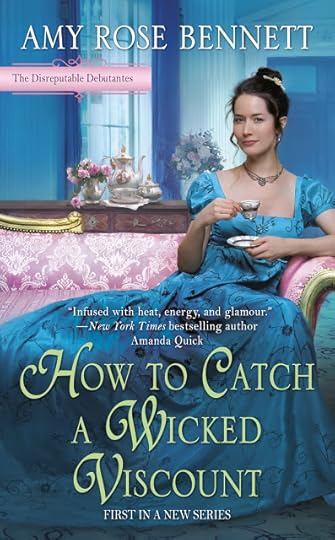
A young lady's tarnished reputation might cost her everything in this first book in the Disreputable Debutantes series.
Shy, bookish Sophie Brightwell is expected to make an advantageous match to improve her family's fortunes. However, Sophie's plans to make a spectacular debut go horribly awry when she and her three closest friends are expelled from a young ladies' academy for unbecoming conduct. Since the ton will be sure to close their doors on these disgraced debutantes, they determine that unconventional means need to be employed in the husband-hunting market. Rakehells—the beau monde's wickedest members—might be the only men willing to overlook a young lady's besmirched reputation.
But how does one catch a rake?
Nate Hastings, the devil-may-care Viscount Malverne, is the older brother of Sophie’s best friend, fellow disgraced debutante Lady Charlotte. When a terribly foxed Nate accidentally compromises Sophie, Charlotte strikes a wicked bargain: in order to avoid a scandal and the parson's mousetrap, Nate must help Sophie snare a husband. But as Nate fulfills his obligation and begins to instruct the lovely Sophie in the art of luring rakes, he soon finds himself battling his own fierce attraction to her.
Praise for How to Catch A Wicked Viscount
"Readers will enjoy this expertly executed Regency with likable characters. A well-written start to a historical romance series full of rakes and the women who love them." Kirkus Reviews
"Amy Rose Bennett's HOW TO CATCH A WICKED VISCOUNT is delightful Regency romance infused with heat, energy and glamour. Bennett effortlessly captures the ingredients that make Regency romance so compelling to readers: sparkling dialogue, passion, and the elegant ballroom manners that mask the danger and risks that lie just beneath the surface." Amanda Quick, New York Times bestselling author
"A sweet and spicy read full of sly wit and rich with delicious details that pull the reader into the scene. A delightful confection of ballroom banter and bedroom seduction.” Sally Mackenzie, USA Today bestseller
“Amy Rose Bennett is a fresh new voice in historical romance with a flair for historical atmosphere. In HOW TO CATCH A WICKED VISCOUNT she introduces us to a set of lively characters embarking on a fun, lighthearted, tried and true reader favorite romp.” Anne Gracie
"Sexy, sweet, romantic and funny, How to Catch a Wicked Viscount will steal your heart away. Amy Rose Bennett is a charming new voice in historical romance." Anna Campbell
Pre-order your copy ofHow to Catch a Wicked ViscountAmazon • Kobo • Barnes and Noble • iBooks • Google • Penguin Random House
How to Catch a Wicked Viscount is out on August 27th
Amy Rose Bennett
 Amy Rose Bennett is an Australian author who has a passion for penning emotion-packed historical romances. Of course, her strong-willed heroines and rakish heroes always find their happily ever after.
Amy Rose Bennett is an Australian author who has a passion for penning emotion-packed historical romances. Of course, her strong-willed heroines and rakish heroes always find their happily ever after.A former speech pathologist, Amy is happily married to her very own romantic hero and has two lovely, very accomplished adult daughters. When she’s not creating stories, Amy loves to cook up a storm in the kitchen, lose herself in a good book or a witty rom-com, and when she can afford it, travel to all the places she writes about.
Connect with Amy Rose: Website • Facebook • Twitter • Bookbub • Pinterest • Amazon
Published on August 11, 2019 20:00
August 9, 2019
Book Review — Storytellers by Bjørn Larssen #HistoricalFiction @bjornlarssen

StorytellersBy Bjørn Larssen

In March 1920 Icelandic days are short and cold, but the nights are long. For most, on those nights, funny, sad, and dramatic stories are told around the fire. But there is nothing dramatic about Gunnar, a hermit blacksmith who barely manages to make ends meet. He knows nobody will remember his existence – they already don’t. All he wants is peace, the company of his animals, and a steady supply of his medication. Sometimes he wonders what it would feel like to have a story of his own. He’s about to find out.
Sigurd – a man with a plan, a broken ankle, and shocking amounts of money – won’t talk about himself, but is happy to tell a story that just might get Gunnar killed. The blacksmith's other “friends” are just as eager to write him into stories of their own – from Brynhildur who wants to fix Gunnar, then marry him, his doctor who is on the precipice of calling for an intervention, The Conservative Women of Iceland who want to rehabilitate Gunnar’s “heathen ways” – even that wicked elf has plans for the blacksmith.
As his defenses begin to crumble, Gunnar decides that perhaps his life is due for a change – on his own terms. But can he avoid the endings others have in mind for him, and forge his own?

Published on August 09, 2019 20:00
#BookReview — The Duchess of Gracechurch Trilogy Box Set by Catherine Kullmann #HistoricalRomance #RegencyRomance @CKullmannAuthor
The Duchess of Gracechurch Trilogy Box Set
By Catherine Kullmann
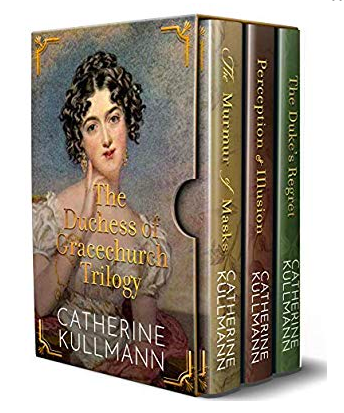
A Regency celebration of friendship, family and love.Book One: The Murmur of MasksDesperately in need of security following the sudden death of her mother and unaware that his affections are elsewhere engaged, a distraught Olivia accepts Jack Rembleton's offer of a marriage of convenience. When Olivia meets Luke Fitzmaurice at a ball given by the Duchess of Gracechurch, Luke is instantly smitten but Olivia cannot respond. An unexpected encounter with Luke at a masquerade ten years later leads to a second chance at love. Dare Olivia grasp it? Before she can decide, Napoleon escapes from Elba and Luke joins Wellington's army in Brussels. Will war once again dash Olivia's hopes of happiness?Book 2: Perception & IllusionCast out by her father for refusing the suitor of his choice, Lallie Grey, accepts Hugo Tamrisk’s proposal, confident that he loves her as she loves him. But Hugo’s past throws long shadows as does his recent liaison with Sabina Albright. All too soon the newly-weds are caught up in a comedy of errors that threatens their future happiness. When a perfect storm of confusion and misunderstanding leads to a devastating quarrel with her husband, Lallie feels she has no choice but to leave him. Can Hugo win her back? Will there be a second, real happy end for them?Book 3: The Duke’s RegretA chance meeting with a bereaved father makes Jeffrey, Duke of Gracechurch realise how hollow his own marriage and family life are. Persuaded to marry at a young age, he and his Duchess, Flora, live largely separate lives. Now he is determined to make amends to his wife and children and forge new relationships with them. Flora does not know how to respond to her husband’s suggestion. Can Jeffrey break down the barriers between them and convince her that his change of heart is sincere? Flora must decide if she will hazard her heart and her hard won peace of mind for a prize of undreamt of happiness.

I adore Regency Romances, so when Catherine Kullmann approached me and asked me if I would be interested in reading The Duchess of Gracechurch Trilogy Box Set, well, of course, I said yes!
The box set contains three fabulous romance books:
The Murmur of Masks.Perception & Illusion.The Duke’s Regret.
I am going to approach this review as I approached the box set — one book at a time.
The Murmur of Masks
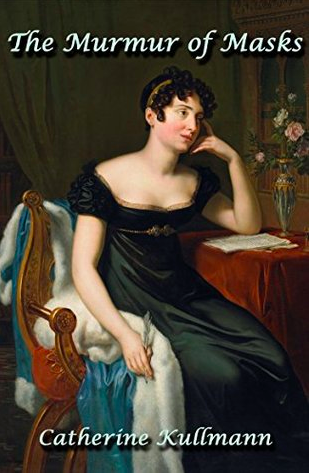
“She needs to find a safe harbour...”
But is Jack Rembleton the answer to all her worries?
When her mother dies unexpectedly, Olivia Frobisher only has her uncle to turn to — for her father and brother are at sea fighting the French. But her uncle is of advancing years, and if anything were to happen to him, Olivia would be destitute. Her only answer was to marry. But what did she know of men?
Marriage to Jack wasn’t what Olivia had expected it to be. Even though this was an arranged marriage, Olivia had hoped that love might grow between them. But alas, no. It seemed that Jack did not have it in him to love anyone. But at least Olivia is safe, that is something is it not...?
Olivia is determined to be content, and she was, sort of, until she met Luke Fitzmaurice. It was only then that Olivia realised — too late — that she had married in haste.
From the busy port of Portsmouth to the thrill of a masquerade ball, The Murmur of Masks by Catherine Kullmann is what Regency Romance is all about.
I fell in love with this book within the first few pages, and I simply adored Olivia and Luke. Their romance is ten years in the making, which made this book refreshingly different from other Regency Romances that are out there. Luke is the kind of man that makes ladies swoon. He is dashing, witty, and more importantly, kind. Luke really could have anyone he wants, but he is hopelessly in love with Olivia. Likewise, Olivia has deep feelings, feelings that she dare not dwell on, for Luke. It is only in a moment of wild abandonment when she lets herself feel and experience things with Luke when she realises just how much she has missed out on. Olivia was a character that I could not help but like.
The Murmur of Masks is absorbing and heartwarming, but Kullmann also shows what living in the Regency period was like. This was a time of morals and manners. Kullmann demonstrates how difficult it was if you loved where you should not. Jack marries a woman he is not in love with and who he will never be in love with. He marries to avoid a scandal or worse, for Jack is utterly and irrevocably in love with his esteemed colleague. In an age where homosexuality was illegal, I thought Kullmann demonstrated most admirably what an awful situation it was when to do something as simple as falling in love was considered a crime. Kudos, Ms Kullmann.
The Murmur of Masks is absolutely fabulous.
Perception & Illusion
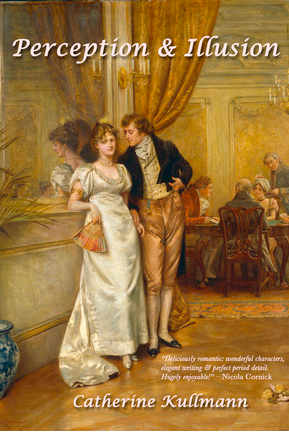
“I assure you that I will never marry Mr Malvin...”
Lallie Grey finds herself in an impossible situation. If she stays, she will be forced to marry the vile Mr Malvin. If she stays, she will face her father’s wrath. The only option left to her is to run away.
Hugo Tamrisk was enchanted the moment he met Lallie Grey. She is so different to the women he usually spends time with. He would like to get to know her better. But when he sees Lallie and her lady maid at an inn and in obvious distress, his honour and integrity demand that he offer Lallie his help. However, due to the circumstances of his intervention, Hugo has no choice but to offer Lallie his hand in marriage.
Lallie did not know what she would have done without Mr Tamrisk’s help, and she is more than a little in love with him when he proposes. She looks forward to a long and happy life with him. But a dalliance from Hugo’s recent past threatens to destroy their new-found love.
From desperate beginnings to the sensuality of a masquerade ball, Perception & Illusion by Catherine Kullmann is an example of historical romance at its best.
Kullmann has given her readers a courageous heroine in Lallie, who is not afraid to stand up for herself and a dashing hero in Hugo who will do anything for the woman he loves. Mix into this several wicked antagonists, the etiquette of the Ton, the hint of a scandal, and the battle to save a marriage, along with a good dollop of humour, makes Perception & Illusion a real winner.
Kullmann has a keen novelist eye for what is entertaining as well as being able to pen the most beautiful and believable of romances. I adored this book from beginning to end. Unquestionably brilliant.
The Duke’s Regret
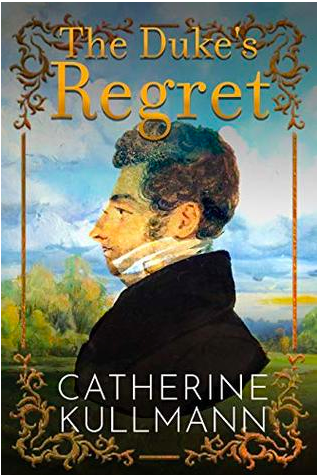
“I am aware that I have been inconsiderate, even negligent, both as a husband and a father. I wish to make amends...”
Flora had only been seventeen when she had been forced to marry Jeffrey. He had not cared for her and nor she for him. In the years that had past, she had wondered what life would be like without him. If it were not for her children, she would have... She would have what? Sought a divorce? She had most certainly thought about it, but the scandal... Flora was 35 years old, was the rest of her life to be as loveless as the first half?
Falling in love with Meg had been easy, and there had been no place in Jeffrey’s heart for his wife. But Meg had been dead these many years, along with his baby daughter. But while grieving for them, he had failed to see the treasure that was right in front of him. It was time to be a proper father to his and Flora’s children. And it was time to be a proper husband to his wife. The only question is, has he left it too late?
Filled with romance and passion, The Duke’s Regret by Catherine Kullmann is a story about the power of forgiveness.
What a wonderfully romantic tale, Kullmann has weaved. Jeffrey and Flora’s marriage has been a loveless one. But now Jeffrey has seen the light. He wants his family, and he wants his wife. I thought Jeffrey’s characterisation was incredibly insightful, and once again, Kullmann shows precisely what it was like to marry where there is no love. Jeffrey’s devotion to his mistress and his grief at her loss was heartbreaking, but his determination to become a better man, to become a father to his children and a husband to Flora made him not only likeable but very real in the telling. The Duke’s Regret is a book about second chances, and it is a delightful read.
Flora, likewise, was a fabulous heroine. She has been the model wife, but she longs for love with all her heart. Her doubts at Jeffory’s sincerity is understandable, but Flora wants what her friends have. She wants a husband who loves her, and she is willing to take a mighty leap of faith on Jeffrey’s promise.
I thought this book was a fantastic addition to the trilogy.
The Duchess of Gracechurch Trilogy Boxed Set would make a wonderful gift for those who love the romance of the Regency era. Perfect romantic escapism.
I Highly Recommend.
Review by Mary Anne Yarde.The Coffee Pot Book Club.
Pick up your copy ofThe Duchess of Gracechurch Trilogy Box SetAmazon UK • Amazon US
Catherine Kullmann
 I was born and educated in Dublin. Following a three-year courtship conducted mostly by letter, I moved to Germany where I lived for twenty-five years before returning to Ireland. I have worked in the Irish and New Zealand public services and in the private sector.
I was born and educated in Dublin. Following a three-year courtship conducted mostly by letter, I moved to Germany where I lived for twenty-five years before returning to Ireland. I have worked in the Irish and New Zealand public services and in the private sector.I have a keen sense of history and of connection with the past which so often determines the present. I am fascinated by people. I love a good story, especially when characters come to life in a book.
I have always enjoyed writing, I love the fall of words, the shaping of an expressive phrase, the satisfaction when a sentence conveys my meaning exactly. I enjoy plotting and revel in the challenge of evoking a historic era for characters who behave authentically in their period while making their actions and decisions plausible and sympathetic to a modern reader. In addition, I am fanatical about language, especially using the right language as it would have been used during the period about which I am writing. But rewarding as all this craft is, there is nothing to match the moment when a book takes flight, when your characters suddenly determine the route of their journey.
Connect with Catherine: Website • Twitter • Goodreads.
Published on August 09, 2019 19:00
August 8, 2019
Have you heard? Candace Robb is giving away a Hardcover copy of her fabulous book — A Conspiracy of Wolves @CandaceMRobb @severnhouse @hfvbt
Historical Fiction Virtual Blog Tours Presents…
A Conspiracy of WolvesBy Candace Robb
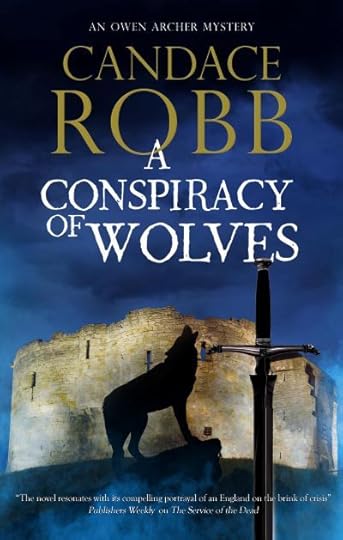
When a prominent citizen is murdered, former Captain of the Guard Owen Archer is persuaded out of retirement to investigate in this gripping medieval mystery.1374. When a member of one of York’s most prominent families is found dead in the woods, his throat torn out, rumours spread like wildfire that wolves are running loose throughout the city. Persuaded to investigate by the victim’s father, Owen Archer is convinced that a human killer is responsible. But before he can gather sufficient evidence to prove his case, a second body is discovered, stabbed to death. Is there a connection? What secrets are contained within the victim’s household? And what does apprentice healer Alisoun know that she’s not telling?Teaming up with Geoffrey Chaucer, who is in York on a secret mission on behalf of Prince Edward, Owen’s enquiries will draw him headlong into a deadly conspiracy.
Excerpt
For a while they had traveled behind a group of players who serenaded them with songs and japes, a felicitous arrangement, though he hoped that his eight-year-old daughter Gwenllian would forget the bawdier lyrics. Now that the players had moved on, the monotonous rattle of the cart and horses was punctured occasionally by sounds of reapers and gleaners in the fields, though not as many as on their journey to Freythorpe. Harvest was almost over. Adding to the monotony, his companion droned on and on about something – Owen had stopped listening to Geoffrey a while back. Chaucer was shaping one of his poems aloud, replete with mythical palaces, gods, fantastical creatures, which might be entertaining but for his pauses to play with language, trying a phrase this way and that. Owen was perhaps to blame, having insisted that Geoffrey not address the mission that had brought him to York until they returned to the city. He’d hoped the man might ride in silence, but he’d know that was too much to ask of the chattering jay.
In her wisdom, Magda Digby might have found a way to delay Geoffrey’s departure. Thou art needed in the city, she had told Owen as they sat beneath an oak the previous evening, drawing down the day. Depart in the morning.
But Lucie . . .
Agrees with Magda. She has readied the children.
How do you know?
Not the question, Bird-eye. She had turned to him, pressing her forefinger to the spot between his eyes. Open thine eyes. Trust thyself. The wolves circle their prey. Thou hast the sight to see what awakens.
He’d questioned the wolves. They came only in winter, the wolves that the steward of the Forest of Galtres swore no longer bided in the land.
What do folk see when they see a wolf, Bird-eye? The animal? Think again.Magda Digby, his guide, his tormentor. In his mourning for John Thoresby, Owen had sought her out, confided in her all that was in his heart. Long she listened, holding his hands, looking into his eye. Open thine eyes, she repeated, and corrected him when he argued that he had but one. He did not understand, and she did not explain. Her last words to him on departing Freythorpe, Trust thyself, Bird-eye. Thou art called.
GiveawayDuring the Blog Tour, we are giving away a Hardcover copy of A Conspiracy of Wolves by Candace Robb! You can enter HERE!Giveaway Rules
• Giveaway ends at 11:59 pm EST on August 15th. You must be 18 or older to enter.
• Giveaway is open to the US only.
• Only one entry per household.• All giveaway entrants agree to be honest and not cheat the systems; any suspicion of fraud will be decided upon by blog/site owner and the sponsor, and entrants may be disqualified at our discretion.• The winner has 48 hours to claim prize or a new winner is chosen.
Pick up your copy ofA Conspiracy of WolvesAMAZON
BARNES AND NOBLE
INDIEBOUND
Candace Robb
 I’m Candace Robb, a writer/historian engaged in creating fiction about the late middle ages with a large cast of characters with whom I enjoy spending my days. Two series, the Owen Archer mysteries and the Kate Clifford mysteries, are set in late medieval York. The Margaret Kerr trilogy is set in early 14th century Scotland, at the beginning of the Wars of Independence. Two standalone novels (published under pseudonym Emma Campion) expand on the lives of two women in the court of King Edward III who have fascinated me ever since I first encountered them in history and fiction.I am a dreamer. Writing, gardening, walking, dancing, reading, being with friends—there’s always a dreaming element.Connect with Candace:WEBSITE • FACEBOOK • TWITTER • BOOKBUB
I’m Candace Robb, a writer/historian engaged in creating fiction about the late middle ages with a large cast of characters with whom I enjoy spending my days. Two series, the Owen Archer mysteries and the Kate Clifford mysteries, are set in late medieval York. The Margaret Kerr trilogy is set in early 14th century Scotland, at the beginning of the Wars of Independence. Two standalone novels (published under pseudonym Emma Campion) expand on the lives of two women in the court of King Edward III who have fascinated me ever since I first encountered them in history and fiction.I am a dreamer. Writing, gardening, walking, dancing, reading, being with friends—there’s always a dreaming element.Connect with Candace:WEBSITE • FACEBOOK • TWITTER • BOOKBUB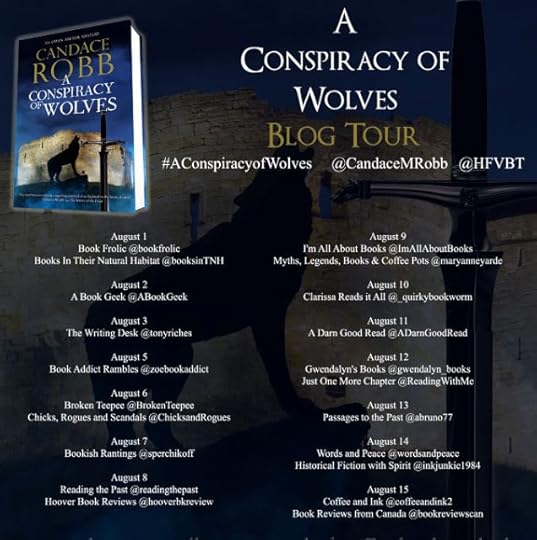
Published on August 08, 2019 20:00
August 7, 2019
The Coffee Pot Book Club
The Coffee Pot Book Club (formally Myths, Legends, Books, and Coffee Pots) was founded in 2015. Our goal was to create a platform that would help Historical Fiction, Historical Romance and Historical
The Coffee Pot Book Club (formally Myths, Legends, Books, and Coffee Pots) was founded in 2015. Our goal was to create a platform that would help Historical Fiction, Historical Romance and Historical Fantasy authors promote their books and find that sometimes elusive audience. The Coffee Pot Book Club soon became the place for readers to meet new authors (both traditionally published and independently) and discover their fabulous books.
...more
...more
- Mary Anne Yarde's profile
- 159 followers



